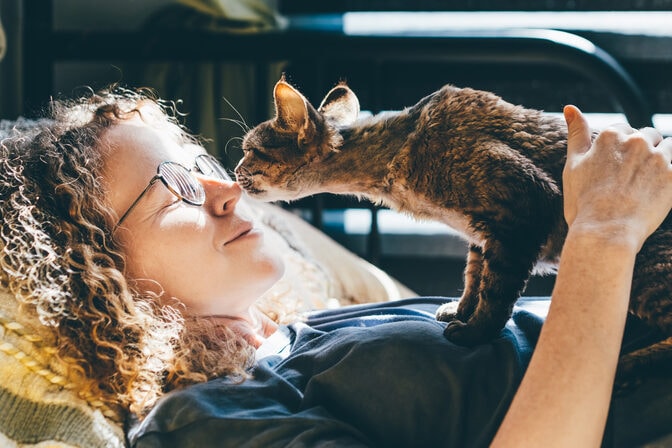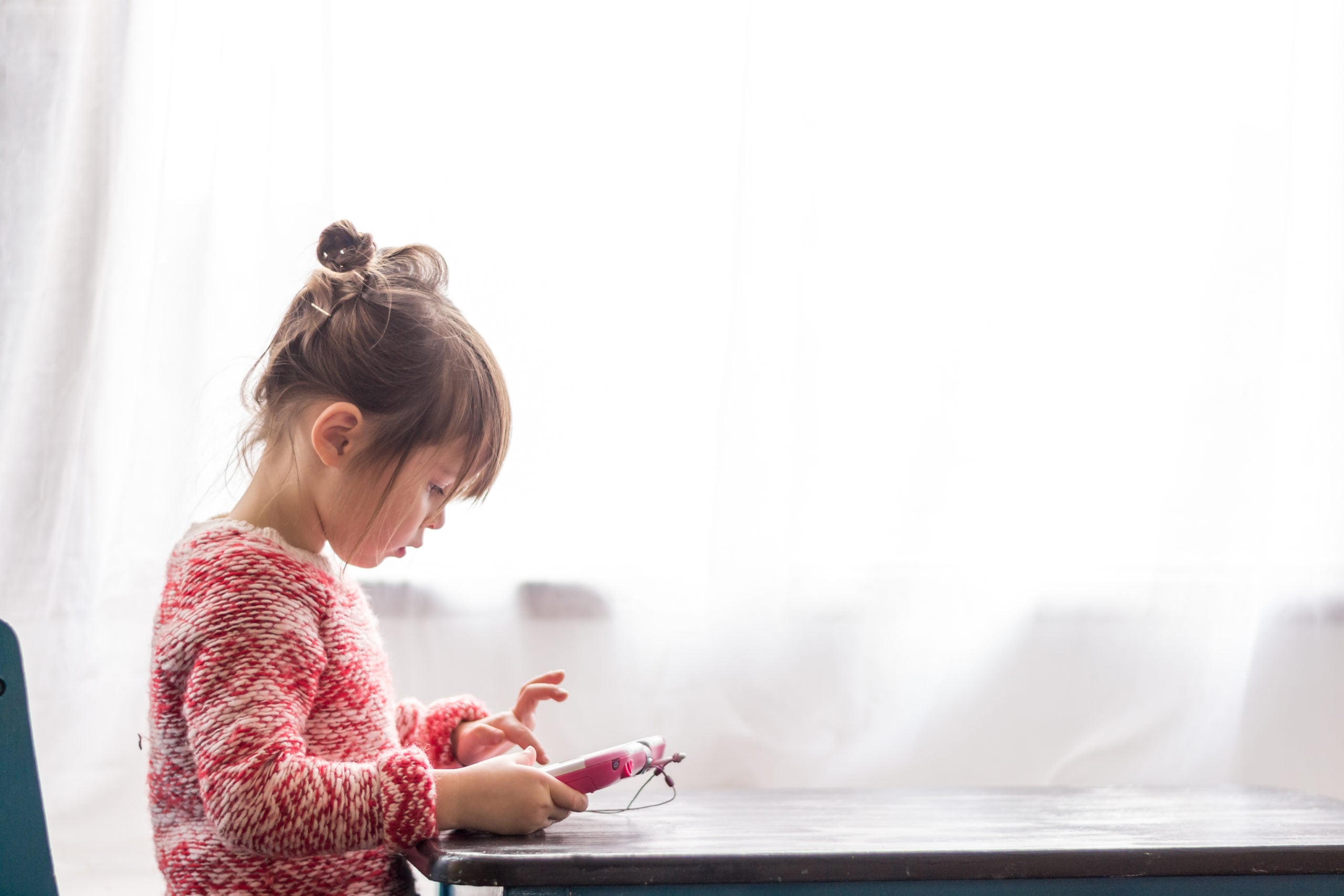In this article
From feeding their finicky appetite to scooping their poop, you’d do anything for your cat. But when they squirm out of your snuggles instead of welcoming you home from work, you might wonder if your love is unrequited, especially if you’re a recently converted “dog person.”
“Cats are misunderstood because people expect them to behave like dogs. But that doesn’t set them up for success because they are a completely different species and they have their own ways of communicating with us,” says Dr. Marie Chan, veterinarian at Small Door Vet. “Feline communication is often subtle and may be missed if you don’t know what to look for.”
We asked cat behavior experts how to look for subtle signs your cat loves you, why some are more affectionate than others and how to foster a stronger bond with a fickle feline family member.
Key takeaways
- Cats show love through subtle behaviors like head bunting, purring and slow blinking.
- Understanding these signs helps strengthen your bond.
- Respecting their unique communication builds trust and affection.
How can you tell if a cat loves you?
On some level, you probably already know that your cat loves you back, even if it’s just a gut feeling. And while your cat will never tell you in plain English, there are many ways to pick up on the love they’re putting down.
“Feline communication is often subtle and may be missed if you don’t know what to look for.”
— Dr. Marie Chan, veterinarian
For one, animal behavior researchers have observed an uptick of oxytocin, the feel-good “cuddle hormone,” in both humans and their cats during interactions. This is the same hormone that stimulates bonding between parents and their human babies. And based on certain behavioral cues, there’s a chance your cat really does think they’re your baby.
“Cats typically don’t meow to other cats. They make all sorts of other sounds but meowing isn’t common. But kittens meow to their moms, and adult cats meow to us. It is this behavior that makes us believe that we are often at least partly in a maternal relationship with cats,” reveals Stephen Quandt, founder of Feline Behavior Associates, LLC. “We’re all the moms and they’re the kittens.”
7 signs a cat loves you
Besides speaking the love language of kittens, there are numerous other ways your cat is quietly signaling their affections for you. Here are seven of our favorites, explained by vets.
1. Head bunting
“Bunting,” or rubbing their head and face on you is a sure sign that your cat sees you as one of their clan, explains Dr. Zazie Todd, animal behavior expert, author of “Purr: The Science of Making Your Cat Happy” and creator of the Companion Animal Psychology blog.
“When cats rub their head like that they are depositing pheromones from glands on their neck and head. This is something they do with other cats who they like and it’s thought to build up a group scent. So if they are putting that scent on you, it’s a sign that you are part of their social group and they love you,” explains Todd. Think of it as your own personal purr-fume!
2. Purring
It’s no secret that cats purr when they’re happy, but what does that rumble really mean? According to BBC Science Focus, scientists have been investigating the hows and whys of purrs for decades — and they still don’t have clear answers.
One study found that the pitch of a cat’s purr may match their mood. For example, when a cat is hungry, they may produce a high-pitched trill that imitates the vocal cue of a human infant, activating their pet parent’s innate instinct to feed their “baby.”
When they’re not manipulating us for extra meals, cats can use those purring powers for good. The frequency of a low-pitched rumble of a cat at rest has been shown to help stimulate healing and promote bone density not only in themselves but also in their human companions. Talk about good vibes!
3. Kneading or making biscuits
Does your cat ever get so comfy that they knead on you with their paws, possibly also suckling on the nearest surface? Quandt explains that this behavior, colloquially known as “making biscuits,” is a relic of your cat’s kittenhood, when they would massage at their mother’s teat to help expel more milk. While your cat may never expect your elbow to spontaneously lactate, this self-soothing behavior is a telltale sign that your cat sees you as their parent.
4. Happy tail
If you’re looking for a wagging tail to validate your cat’s love, you won’t find it. Even so, their tail’s movements are worth a thousand words. “Cats may behave like dogs and come greet you at the door when you return home, and you may notice their tail is straight up in the air with a slightly curved tip when they do,” says Chan. That expressive, question-mark-shaped tail, which your cat may wrap around your legs, is sure to be a happy one.
5. Being next to you
Chan notes that some cats can be even more subtle in the ways they show affection. Those that aren’t fond of cuddling may follow their favorite human around their home. “Some cats, especially the shy ones, are less demonstrative, and in that case, another sign that they love you might simply be that they are choosing to spend time near you — watching you while you work, sitting on the sofa with you (even if not on your lap) or just choosing to be in the same room of your home as you are. This shows that they like to spend time with you,” agrees Todd.
6. Slow blink
Does your cat ever start dozing off while you’re talking to them? No, you’re not boring your cat to sleep — you’re actually receiving one of the greatest compliments of cat-kind. “If a cat slowly blinks at you, it is a sign they trust and love you enough to close their eyes,” says Chan. “In the wild, cats were both predator and prey, so closing their eyes shows they are willing to be vulnerable in front of you.”
7. Showing their belly
If you’ve ever fallen for what many pet parents deem “the tummy trap,” you know that a belly rub quickly escalates to a flurry of fangs and claws. But if cats hate belly rubs so much, why do they always stretch out and show that irresistibly soft underbelly? As it turns out, this is your cat’s way of showing you that they feel safe around you. When you indulge in a soft pet, though, you risk overstimulating your cat’s ultra-sensitive belly and triggering them to unleash their love bites.
“A lot depends on the cats’ early experiences as a kitten because kittens who don’t grow up in a household with humans are going to be afraid of most people.”
— Dr. Zazie Todd, animal behavior expert and author
How to bond with your cat
Worried about your bond with your cat? Keep in mind that how sociable your cat is depends on many factors, including their early kittenhood experiences.
“A lot depends on the cats’ early experiences as a kitten because kittens who don’t grow up in a household with humans are going to be afraid of most people,” says Todd. “In that case, they might develop a bond with one person, but they are unlikely to form bonds with other people as they would be too afraid to interact with them.”
Whether you’d like to help them come out of their shell or you’re just not your cat’s favorite person, you can try these vet-approved techniques to make them more comfortable.
Greet your cat with a nose-touch
Quandt says that cats greet each other with nose-touches and may appreciate it if you imitate this gesture with a nose-to-nose or finger-to-nose touch.
Return the slow-blink
Slow-blinks work both ways. Try making eye contact with your cat and slowly opening and closing your eyes as though you’re on the verge of falling asleep. Don’t be surprised if your cat does it back!
Ditch the automatic feeder
While an automatic feeder is convenient and may be necessary if your cat is left alone, it can take away crucial bonding time.
Avoid resorting to punishment
It’s common for pet parents to attempt to discourage unwanted behaviors with yelling or spray bottles, but Todd warns that these punishments can permanently damage your bond. Instead, train your cat with positive reinforcement and redirect behaviors. For example, to stop your cat from scratching furniture, provide plenty of appropriate scratching surfaces.
Give your cat choices
While it’s tempting to grab your cat anytime you want a cuddle, Todd explains that they respond best to patience and they’re more likely to come around if you give them choices in interactions and allow them to initiate contact.
The bottom line on understanding your cat
Feeling the love from your cat is all about learning their language. Experts and research studies suggest that cats not only love us back but see us as close members of their feline family. By recognizing the subtle signs your cat loves you and saying it back in a way they can understand, you can build a strong, healthy relationship with your kitty companion.
If you’re concerned about your cat’s behavior or well-being or just need advice to make sure you’re giving them the best life possible, reach out to your veterinarian or a veterinary behaviorist.





